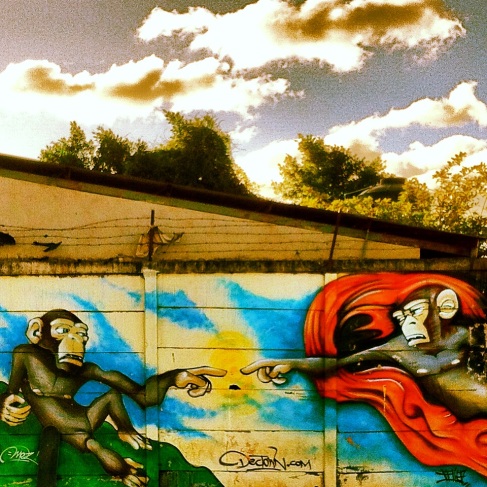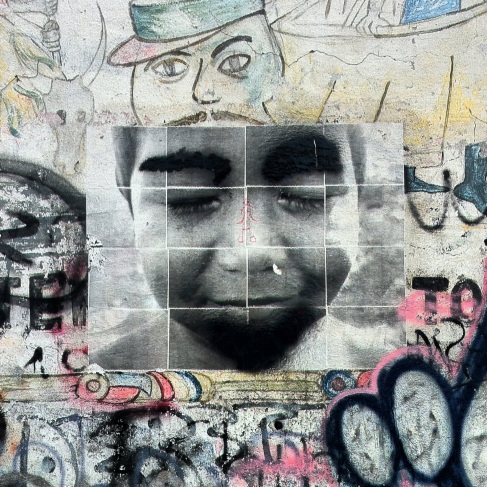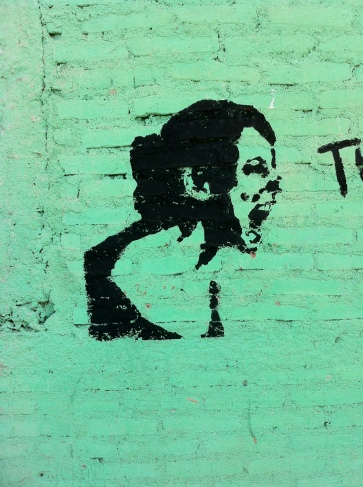The Age of Consent, or: How I learned to Stop Worrying and Love the Slums
On Christmas Eve, in the streets of a small frontier town, my pockets (all four, impressively) were picked and emptied. I knew the thief, but it was Christmas after all, and I considered my loss a gift. Feliz Navidad. In lands of subjective justice, anyway, trouble is only worsened by accusations. Police are to be avoided, if possible. And also, feeling victimized would have only sullied my holiday cheer, not to mention my Toña beer buzz, delightfully heightened by the fresh altitude in the City of Mist.
We are talking small dope here; I lost 300 Córdobas (12 dollars), and my notebook, which contained trails of scribble, and a long, mystic, run-on letter addressed to the Humanists and Explorers among us. Freud said nothing is ever forgotten, only repressed. So, here’s a recreation of what’s already been lost, but can surely be found…
EAT, FUCK, KILL. So read the graffiti written at the entrance of a schoolyard in Maldita. I took careful comfort that the word sequence wasn’t reversed. Just beside the dripping BLOCK letters were two grimacing monkeys blotting out the cruel vision of the sun: A fatalist’s warm welcome. What do they say, We are free to care, we just never do?
It’s getting dim out here, and after dark it’s a jungle. No, it’s a not a jungle; these are not animals boxing nobly for survival. This is a landfill of soul thievery. Everyone in the Maldita barrios have caged themselves in their trenches and foxholes, hiding from their cannibal neighbors. Barred windows, barbed wire, deadbolts, spikes and glass shards stand between home and the cemetery, encroaching seamlessly into view, a perfect blend. This is the Age of Homogeny, is it not?
It was Sunday morning in Maldita. This was the day when the Kia, which looked more like a space pod than an automobile, was to be raffled off. Two men in the park grumbled about the contest and asked me if I knew the winner. I said, No, do you? Sure, they said, we know, but for us the odds are astronomical. So, I asked somewhat confused, Who won the car? They laughed again, Somebody who doesn’t need it!
After the drawing, women and children shuffled into church pews. The men, across the street, sat on bleachers drinking beer and betting on cockfights. I was remembering a French writer who remarked, Only an animal does useful things. Give into being human! This is the Age of Distractions, huh? The moaning and groaning of organ chops echoed into the streets, and from under the grandstands I could hear the roosters’ final sighs as they were stabbed to death, one by one, with beak and blade. After the sermon and all the chicken carcasses were sold, everyone filed into saloons and crooned ranchero songs, always a ballad about transient love, long broken and frayed.
At roughly 11pm, the rugged saloons closed and prissy discotecas opened. The music went from loud and obnoxious to intolerable and infantile. The most popular song in the country is about men driving around in a taxi and looking at women, eventually getting aroused. And then the ELECTRONIC MUZAK. The sirens grew louder, stomping on subtlety, hammering three-note melodies into a shrill grave. The thundering CHICK-BOO-CHICK-BOO came without musical instruments, unless you count medical devices. I heard the sputtering of an EKG clogging the interstates, the growling of an MRI piercing the atmosphere. It was ANTI-MUSIC.
Outside, food carts were selling hot dogs, each log the color of a mannequin’s legs. The alternatives were killers in its own right, all sugar-coated or honey-dipped. But there’s nothing more apocalyptic than a cylinder of pig entrails and pulverized bones.
Any sign of life, Mayor? The Doomsday machine ripped through Maldita some time ago. It has rained anvils, curses and catastrophe for decades, so long that everybody lost count. Oral histories have faded. The scribes all said you can get used to anything, even localized dementia. All the statues and murals, the forced recollection of jaguars and missionaries, warriors and anarchists, are unrecognizable. If the Romans were correct about the city without memory being the saddest city of all, tears are cascading past these crumbling monuments. The old bookstore is a pharmacy and the music shop is selling rifles. The people are seeking solace in pills, staring 40 billion miles into the sun, and settled secure in rocking chairs holding automatic weaponry.
There are alert men on the corners wearing fatigues. The uniform, in the very least, commands respect. This was a heavy battleground for the Sandinistas. There are still markings of the ruling party, black and red like the devil’s crest, painted on rocks, trees, and concrete embankments. Ominous colors, red for the sacrifice, black for shadows of uncertainty. I wondered if some of the men were hoping for more power struggle. It is understood that paths of victory are lined with horror, but conflict is always more lucrative than peaceful squalor.
If New York City is a living organism, Maldita is a pile of bones. On a good day it’s raw, typically rough. On bad days, in the shadow of volcano row, it’s a savage scene. On the sidewalk, beggars queue up behind the ATM lines. Stray dogs do battle with a circus of horror attacking their genitals. Sun-faded bums are wrapped in drab canvass, their hair is matted by diesel exhaust, and coated in a coal miner’s makeup. Rubbish bins have been picked through by these men, and after by the midnight rats and roaches. The capital city children, fashioned in America’s charitable throwaways, have their face in a bag of glue, a dried film around their chin, eyes fumbling for focus, brains blown into orbit—a street kid supernova.
Dickens would smile, Dante and Eliot would nod in validation. Litter and debris have become part of the landscape, as much as the palmettos on the boulevard. Spent motor oil, chicken bones and firecrackers, sulfured and shredded. The gutters are a brothel of plastics: every unnatural color under the gathering skies. The central park is a grassless dustbin with rusting swing sets made from sewage pipes. The monkey bars could be mistaken for torture devices. The iron park benches have been plundered for scrap, and replaced with splintered wood slats and wire, painted a different shade of green.
There is a blind man who lives on one bench. He calls himself the consummate sinner and says his sight was taken by God rather than by happenstance, which is positively more regretful. If you don’t blame something for your destitution, he says, you’ll never forgive. He has fewer cares than you might imagine. He certainly isn’t sitting around thinking about Nukes or Christmas gifts. The Germans say you reach a certain plateau of contentment after you have suffered greatly.
For those living the vagabond life, the sun is a brute. Dusty winds follow as an insult, whipping from the north, a Honduran export with a similar tragic aroma. Dark clouds climb the mountains and open like a vault. The Chinese proverbs say it’s easy to see the light when your city is full of darkness. The opium essays and their feng shui variations go on and on, but that’s all Confucian babble, Eastern hocus-pocus. This is Southern brutality.
Heavy rains approach like birds of prey, trampling the gravel like the president’s cavalry. The elements have unhinged the charm of Malditas’s neo-colonial Spanish architecture. Orange tiled roofs have been replaced by aluminum, or even yellow palm fronds. The pastel paint has been blackened by battered mud and ozone. The cobblestone streets are an undulating adventure with low collections like small putrid ponds. White-striped tiger mosquitoes follow, breed and deliver dengue and other hitchhiking disease.
In the dry season, water is scarce, and there are no showers and no flushing the commode. This is the Age of Science, and our robots, Curiosity and Opportunity, are driving on the surface of Mars, 140 million miles away. They are looking for water because today this town doesn’t have any. With this technology, we sit waterless and yoked at home.
It’s old sci-fi conjecture that extra-terrestrials have visited Earth countless times, but recently have taken their holidays to more civilized destinations. Of the 500 million other inhabitable planets in the Milky Way, Earth is no longer in the interstellar Top Ten. They have stranded us here, though we try to deny it. When will these other planets have us? Can we pack our azaleas and nuptials and set off tomorrow? And what else are we bringing, honey? Well, I don’t know, but we aren’t lugging that fucking armoire across the galaxy! Bring your creams, ointments, salves, gels, aerosols, blues, reds, testosterone, straights and narrows, malarials, prophylactics, antifungals, antipsychotics and antimatter. Bring all the beauty the barrios have to offer: the vibraphones, blue butterflies and yellow songbirds, the cumbia beats and dancing, heavy on the mid-section, and bring those girls worth fighting for, the gold standard for every man’s life craft, so full of passion their flaming feet are burning up the street.
How can you keep moving unless you migrate too? We’ve always been explorers, hunters and gatherers, scavengers in a crude sense, so let’s get back to our roots. There may be protests, for this is the Age of Division. I see a lot of folks with the sports dailies, but not many telescopes. There will always be those afraid of science, of our fate as Spacemen, or the fate our planet, spinning slowly into the arms of the budding Red Giant, our darling sun. Fate is believing in the future—a fresh start, thank you. The universe is expanding, and there are more options each day. How lucky we are! But look, the nearest rest area is 72 trillion miles away, so we better get moving before rush hour. Gravity be damned!
Or we can just stay. Yeah? Something must thrive in this wasteland. The stats say something like one percent—rodents and landowners, corpulent and smug. Wake up and smell your master’s coffee, stop and smell your boss’ roses, the scent of his wife and forty mistresses. Who says cannibals don’t exist, or only crawl around the canopies of the Congo or New Guinea?
Things are not looking good, and they say you can’t polish a turd, but can’t we try? According to Chaos Theory, amazing things do happen. New brilliant stars are born each day from swirling clouds of gas. Can we simulate such a transformation? Can we brighten our cerebral glow, long dulled by a desperate smog? Or do we need a rocket to reach her, sitting light years away? She is pristine, a crystal-blue clean slate, an Eden in full bloom. Her hair is black as space dust, and the whites of her eyes encompass all the Opportunity in the universe. Point your lens at the night sky and you can see Curiosity, winking and waiting.
Maldita, Nicaragua



